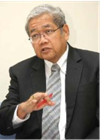 |




|
|
|
Diane Halpern (USA) - Why We Teach: Education for Psychological Literacy and Critical Thinking
Victor Karandashev (Russia) - International Psychology Education: Retrospective and Promise for the Global Future
Lyn Littlefield (Australia) - Australian psychology education – preparation for professional practice?
Sarlito Sarwono (Indonesia) - Toward an Asian Psychology: Learning from the Indonesian experience
Annie Trapp (UK) - Improving the Usability of Psychology Education |
 |
Diane F. Halpern - Claremont McKenna College, Claremont, USA
 <Diane's bio> <Diane's bio>
Why We Teach: Education for Psychological Literacy and Critical Thinking
Sometimes, it is easy for even the most dedicated faculty to lose sight of the why question that should be guiding decisions about teaching. Here are a few examples of teaching-related questions that we have all pondered: Do I really want to use essay questions when it means that I will spend many hours grading and then deal with student complaints about their grades? Should I spend more class time on a topic like research methods that most students find boring or should I move on to topics they prefer such as sex, love, depression, and happiness? How can I get students to see that psychology can be a practical subject that they should be using in their daily lives? This is just a small sample of the many questions that implicitly or explicitly guide the way and the “what” of teaching. It is easy to get bogged down in the mundane issues that confront us as college faculty, but if we rethink the reasons why we teach, these questions become easier to answer, and the daily hassles of our professional lives will seem more like opportunities. By focusing on psychological literacy, which is the idea that students need to be able to recognize and use the basic tenets of psychology-using research as a way of answering questions, understanding how classical and newer theories like cognitive dissonance and stereotype threat operate in everyday life, and applying core concepts as a way of guiding their actions, students will become psychologically literate. As global citizens our students will need to know and use psychological research and theories, and they will need to know how to think critically so that they can use their knowledge of psychology wisely. |
|
 |
Victor Karandashev - Leningrad State University, St.Petersburg, Russia
 <Victor's bio> <Victor's bio>
International Psychology Education: Retrospective and Promise for the Global Future
Over the past two decades, psychology has become global and is focusing special attention to international develop¬ments. Internationalization of psychological knowledge has increased dramatically, not only in research but also in psychology teaching and training. Interest to psychology education has been growing rapidly in many countries.
Until the 1990s, however, little research has been devoted to examining psychology education from the international perspective. 1990-1999 was a period when many publications began to shed light on the national practices in psychology teaching and training. Then, the more global and more purposeful coverage of the topic in publications and research projects appeared. A series of international conferences on psychology education was successfully initiated at the onset of 21th Century. A special issue on international practices in teaching psychology was published in the IUPsyS flagship publication, International Journal of Psychology (2006). The two volumes of Teaching Psychology around the World (2007, 2009) covered the topic from thoroughly international perspectives. Currently, there are a number of compelling arguments for generating a greater understanding and appreciation of the na¬ture of undergraduate and graduate psychology and of how it is taught around the world. In my presentation I will overview the retrospective of international endeavors and talk about global perspectives in the field of psychology education.
|
|
 |
Lyn Littlefield - Australia Psychological Society, Melbourne, Australia
 <Lyn's bio> <Lyn's bio>
Australian psychology education – preparation for professional practice?
Australian psychologists are entering a new national registration and accreditation scheme, which could herald significant changes to education requirements for registration as a psychologist as well as course accreditation. In this address, the current Australian education model for training psychologists will be outlined and competencies gained during undergraduate and postgraduate degree programs will be highlighted. Current issues and the future needs for education to address them, particularly in preparing psychologists for professional practice at various levels, will be discussed. Questions posed will include:
- Should the undergraduate psychology degree be more applied in focus?
- Are professional postgraduate degrees adequate preparation for specialist psychology practice?
- What changes are needed in future Australian models for the education and training of psychologists?
|
|
 |
Sarlito Wirawan Sarwono - Persada Indonesia University, Jakarta, Indonesia
 <Sarlito's bio> <Sarlito's bio>
Towards an Asian Psychology: Learning from Indonesian experience
Psychology in Indonesia was founded in 1953 by a psychiatrist, Prof Dr Slamet Iman Santoso, as part of the Faculty of Medicine at the University of Indonesia (UI). In 1960 it became an independent faculty of UI. The program then was mainly clinical psychology, length of study was 5.5-6 years, and the graduates were eligible to perform psychological practice after being registered with the Indonesian Psychology Association. Their competence was in testing, psycho-diagnostics, counseling, and therapy in clinical, child, industrial and school psychology. Today, there are around 100 faculties in the country offering a Bachelor degree in Psychology. Some of the faculties also provide Master and Doctoral programs in Psychology. Psychology practice and theory has moved from a mainly clinical focus to other non-clinical areas such as school psychology, cyber psychology, and the prevention of terrorism. These changes reflect the efforts of Indonesian psychologists to cope with very fast changes in society and provide solutions to problems which arise due to these changes. Indonesia is not a rich country; therefore there are limited funds for research. In many instances, Indonesian psychologists use out-of-date psychological tests due to the lack of research funding. However, they continue to persevere, using available funds from non-university resources (including local government and foreign aid) and most importantly, they keep active in assisting the community, with the spirit of learning by doing. For example, Indonesia is one of the leading countries in the psychology of disaster survivors and counter terrorism. Asian psychology must be able to provide the solution for Asian people by using a genuine Asian mind. Specific implications for psychology, education and training are highlighted. |
|
 |
Annie Trapp - University of York, York, UK
 <Annie's bio> <Annie's bio>
Improving the Usability of Psychology Education
The undergraduate psychology degree is a strange beast. Its purpose, knowledge-base and learning outcomes are relentlessly challenged. In the majority of European countries there is the expectation that students enrolled on psychology degrees will become professional psychologists and as a result some scepticism about the usefulness of providing a distinct stepping-off point for graduates at the Bachelor level. In countries such as the UK, the US and Australia the Bachelor degree is lauded as a broad non-vocational degree, providing the underpinning for postgraduate psychology courses but also providing a wide range of skills suitable for diverse career pathways. In some departments there is still considerable academic freedom in what is taught but increasingly regulation and accreditation procedures shape and constrain the undergraduate psychology degree in the form of learning outcomes or graduate competencies.
The breadth of knowledge encompassed within the undergraduate psychology curriculum is impressive as evidenced by the thickness of the average introductory textbook. Increasingly attention is being given to the extent of knowledge that can be covered within a three or four year undergraduate programme and the most relevant core knowledge appropriate to different nations and ethnicities.
Notwithstanding the shape of the degree within its local context and the many factors that determine it, our teaching practices have a profound influence on students. Teaching should enable students to achieve the best possible outcomes some of which reach far beyond graduation. This address will explore strands of evidence illustrating ways in which lecturers can help students maximise their success as psychology graduates.
|
|
|
| |
| |
|
| |
 |
  |
| |
|
|
|